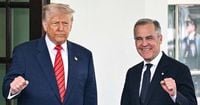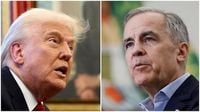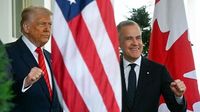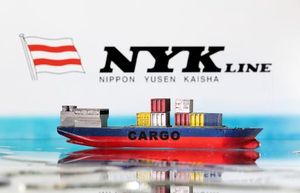In a high-stakes meeting on May 6, 2025, Canadian Prime Minister Mark Carney and U.S. President Donald Trump faced off in the Oval Office amid escalating tensions between their countries. This was the first official meeting between the two leaders since Carney's recent election victory, which was largely fueled by a wave of anti-Trump sentiment. The atmosphere was charged, with trade and national security at the forefront of discussions.
During their meeting, Trump reiterated his long-standing belief that Canada should become the 51st state of the United States. However, Carney firmly pushed back against this notion, stating, "Canada is not for sale, and it won't be for sale, ever." This emphatic declaration was aimed at quelling any speculation about annexation, which has been a recurring theme in Trump's rhetoric.
Trump, known for his brash style, responded to Carney's assertion by quipping, "Never say never," suggesting that the door might remain open for future discussions. The exchange underscored the stark differences in their views on the relationship between the two nations. While Trump framed the idea of annexation as a beneficial move for both countries, Carney maintained that Canadian identity and sovereignty are non-negotiable.
Before the meeting, Trump took to social media to express his grievances regarding the trade balance between the U.S. and Canada. He questioned why the U.S. was "subsidizing" Canada to the tune of $200 billion annually, a claim that has been widely debated and criticized for its lack of accuracy. Official statistics indicate that the trade deficit with Canada in goods and services was approximately $35.7 billion in 2024, significantly lower than Trump's assertion.
As the meeting progressed, it became clear that the two leaders had differing priorities. Carney emphasized the importance of a comprehensive trade agreement, suggesting that a renegotiation of the existing United States-Mexico-Canada Agreement (CUSMA) could provide a framework for future cooperation. He noted, "CUSMA is the basis for a broader negotiation," indicating that while the current agreement has its merits, it may require adjustments to better serve both nations' interests.
Trump, on the other hand, seemed less committed to the idea of renegotiating CUSMA. He stated, "It is a good deal for everybody," but also questioned whether the agreement was even necessary anymore. This ambivalence raised concerns about the future of U.S.-Canada trade relations, especially given the backdrop of Trump's recent tariffs on Canadian goods.
Throughout the meeting, Trump’s demeanor was notably dismissive, often interrupting Carney and failing to give him a chance to respond to his comments. This behavior echoed Trump's earlier remarks about the U.S.-Canada relationship, where he expressed frustration over perceived inequalities in trade and military support. Trump stated, "We don’t need their cars, we don’t need their energy, we don’t need their lumber, we don’t need anything they have, other than their friendship, which hopefully we will always maintain. They, on the other hand, need everything from us!"
Despite the contentious atmosphere, Carney remained composed and focused on the potential for collaboration. He highlighted the historical ties and mutual benefits derived from the U.S.-Canada relationship, noting that the two countries have always worked well together. "The opportunity in Canada’s relationship with the U.S. is in the partnership and what we can build together," Carney asserted.
As the meeting came to a close, Trump made a somewhat lighthearted comment, claiming that he was "probably the greatest thing that happened to him" in reference to Carney’s recent electoral success. This remark, though intended to lighten the mood, reflected Trump's tendency to view political dynamics through a personal lens, often centering discussions around his own influence.
The meeting concluded without any significant breakthroughs on tariffs or trade agreements, leaving many observers questioning the future of U.S.-Canada relations. Carney's insistence that Canada would never yield to U.S. pressure and Trump's unwavering stance on tariffs create a challenging landscape for future negotiations.
As Carney prepared to address the media later that day, he expressed hope that the meeting would mark the beginning of a new chapter in U.S.-Canada relations, despite the hurdles that lay ahead. He stated, "There will be a bigger discussion about renegotiating a trade deal," indicating that while immediate resolutions may not be forthcoming, dialogue would continue.
In the broader context of international relations, the meeting highlighted the complexities of trade negotiations in an era marked by protectionism and nationalistic sentiments. As both leaders navigate their respective political landscapes, the future of the U.S.-Canada relationship remains uncertain, with the potential for both collaboration and conflict looming on the horizon.
In conclusion, while the meeting between Carney and Trump was marked by significant tension and differing priorities, it also opened the door for future discussions on trade and security. Both leaders will need to find common ground if they hope to address the pressing issues facing their nations and foster a more cooperative relationship moving forward.






